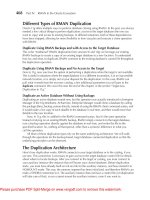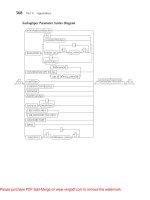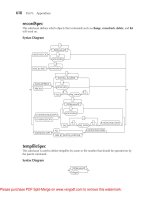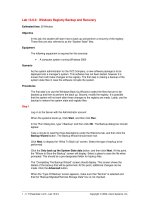Windows Registry Backup and Recovery
Bạn đang xem bản rút gọn của tài liệu. Xem và tải ngay bản đầy đủ của tài liệu tại đây (15.31 KB, 3 trang )
1 - 3 IT Essentials I v2.0 - Lab 13.9.3 Copyright 2002, Cisco Systems, Inc.
Lab 13.9.3: Windows Registry Backup and Recovery
Estimated time: 20 Minutes
Objective
In this lab, the student will learn how to back up and perform a recovery of the registry.
These files are also referred to as the “System State” files.
Equipment
The following equipment is required for this exercise:
• A computer system running Windows 2000
Scenario
As the system administrator for the XYZ Company, a new software package is to be
deployed onto a manager’s system. This software has not been tested, however it is
known that it will make changes to the registry. The first step is making a backup of the
system state files in case the software corrupts the system.
Procedures
The first step is to use the Windows Back Up Wizard to select the files that are to be
backed up and then to perform the back up. Second, modify the registry. It is possible
that the system will not work after these changes to the registry are made. Lastly, use the
backup to restore the system state and registry files.
Step 1
Log on to the Server with the Administrator account
When the systems boots up, Click Start, and then click Run.
In the “Run Dialog box, type “ntbackup” and then click OK. The Backup dialog box should
appear.
Take a minute to read the three descriptions under the Welcome tab, and then click the
Backup Wizard button. The Backup Wizard should start now.
Click Next, to display the “What To Back Up” screen. Select the type of backup to be
performed.
Click the Only back up the System State data button, and then click Next. At this point,
the “Where to Store the Backup” screen will display. Select a place to save the file when
prompted. This should be a pre-designated folder for backup files.
The “Completing The Backup Wizard” screen should display. This screen shows the
details of the backup that will be performed. At this point, additional changes can be
made. Click the Advanced button.
When the “Type Of Backup” screen appears, make sure that “Normal” is selected and
that the “Backup Migrated Remote Storage Data” box is not checked.
2 - 3 IT Essentials I v2.0 - Lab 13.9.3 Copyright 2002, Cisco Systems, Inc.
Click Next. The “How To Backup” screen should display. Verify the backed up data after
performing the backup.
Select the “Verify Data After Backup” check box, and then click Next.
The “Media Options” page will display. Specify whether to “append this backup job to
existing media” or “overwrite existing backup data on the destination media” at the
prompt. Click the Replace The Data On The Media With This Backup button.
Click Next. Now the “Backup Label” screen displays. Supply a label for the backup job
and for the backup media. Windows will supply a backup label and media label by using
the current date and time by default.
In the Backup Label text box, type “System State set created on xxx” (where xxx is
today's date and time). Do not change anything in the “Media Label” text box. Click Next.
When the “When To Back Up” screen displays, choose whether to “run the backup job
now” or “schedule this backup job”. For this lab, select the Now radio button. Click Next.
When the “Completing The Backup Wizard” screen displays, click Finish to start the
backup job.
Windows Backup will display the Selection Information dialog box, indicating the
estimated amount of data for the backup and the time to complete it.
The Windows Backup displays the Backup Progress dialog box, which shows the status
of the backup operation, statistics on estimated and actual amount of data being
processed, the time that has elapsed, and the estimated time that remains for the backup
to complete.
When the backup is complete, click the Report button. A backup report will be displayed.
The backup report contains key details about the backup operation, such as the time it
started and how many files were backed up. When finished, close Notepad.
Close the “Backup Progress” dialog box and the “Backup Dialog” box as well.
Step 2
Go to Start > Run. Type in “Regedt32” in the box. The Registry Editor window should
open.
Expand the “HKEY_LOCAL _MACHINE” Registry Key.
Right-Click the “Hardware Folder” and select Edit, then Delete.
Close the Registry Editor Box. The system is officially broken. In reality, only a virus
would be able to damage the registry like this. The point is that changes to the system
can result in changes to the registry. With the backup, the system can be restored.
Step 3
Locate the Backup file that was saved in Step 1 of this lab.
Double-click on that file. The Backup Utility Wizard displays.
3 - 3 IT Essentials I v2.0 - Lab 13.9.3 Copyright 2002, Cisco Systems, Inc.
Click on the Restore Wizard button. The “Welcome to the Restore Wizard” screen
displays. Click Next.
The “What to Restore” wizard screen will displays. Expand File. Find the backup file that
was created with the proper date and time and expand that as well. Click on the System
State check box. Click Next.
On the “Completing the Restore Wizard” screen click on Advanced.
On the “Where to Restore” screen, make sure that “original location” is selected. Click
Next. If the “Restoring System State will always overwrite files unless restored to a
different location” screen displays. Click OK.
Click on the “Replace existing files if they are older than the backup files” radio button.
Click Next.
Verify that all three radio buttons are selected, then click Next, then click Finish.
The restore will begin by coping the files back to the system showing the progress
results.
When the restore wizard completes, the report can be viewed by clicking the Report
button. Then click Close.
When prompted to restart the system, click Yes. The system will restart.
Troubleshooting
Always back up the registry when installing new software. If something is changed or
removed in the registry that affects the system, using the backup to fix it can save hours
of troubleshooting.
Reflection
How can backing up the system state files save time?
__________________________________________________________________
__________________________________________________________________
__________________________________________________________________
__________________________________________________________________









